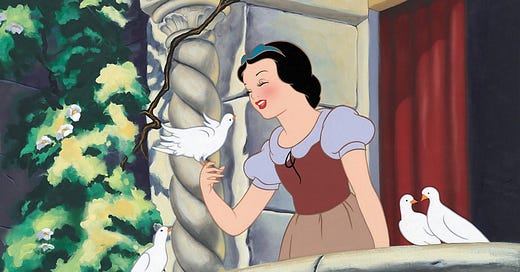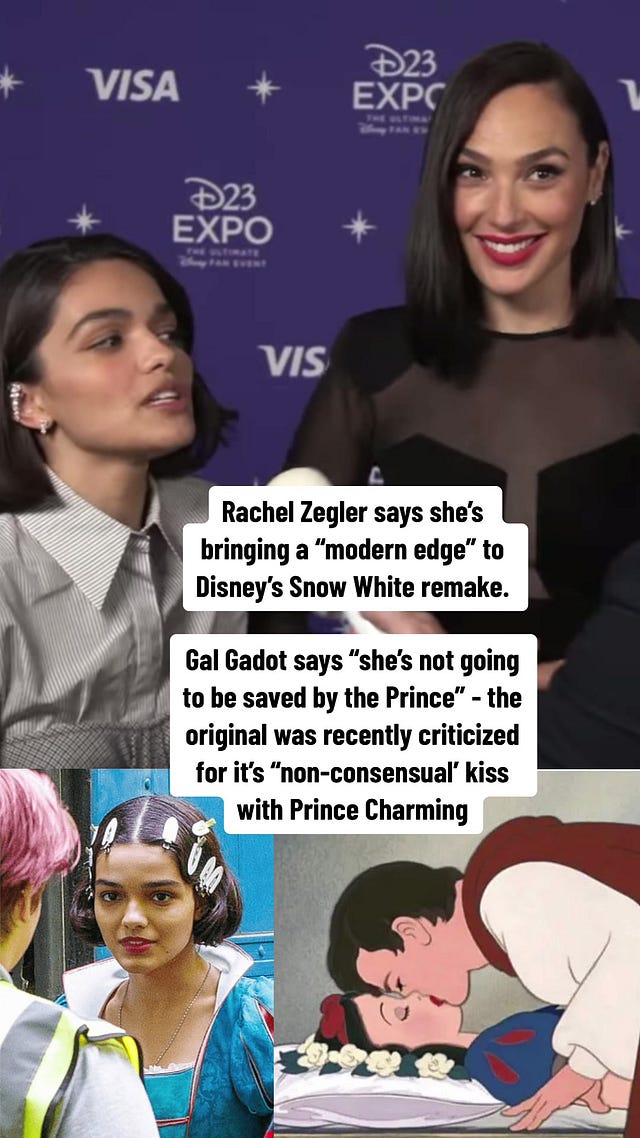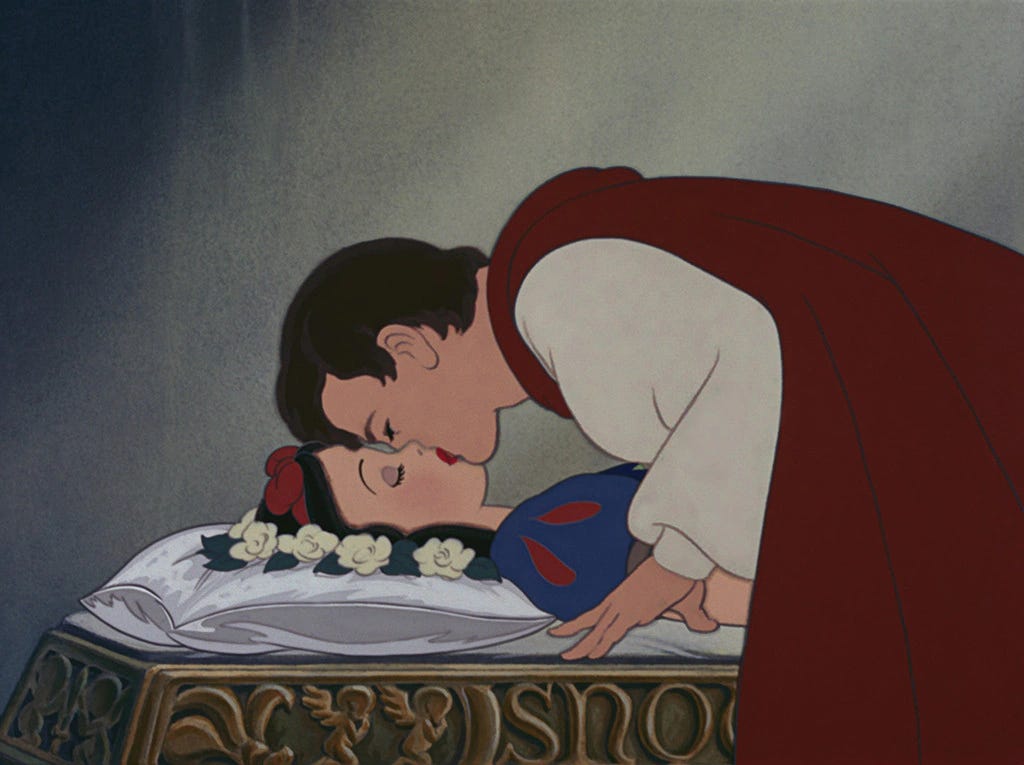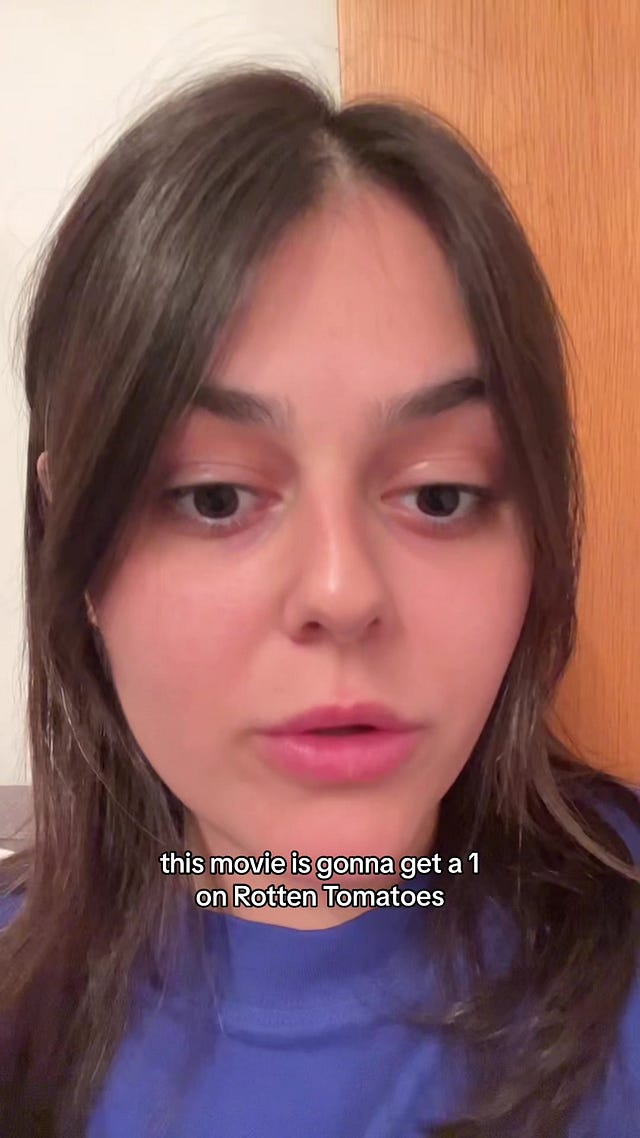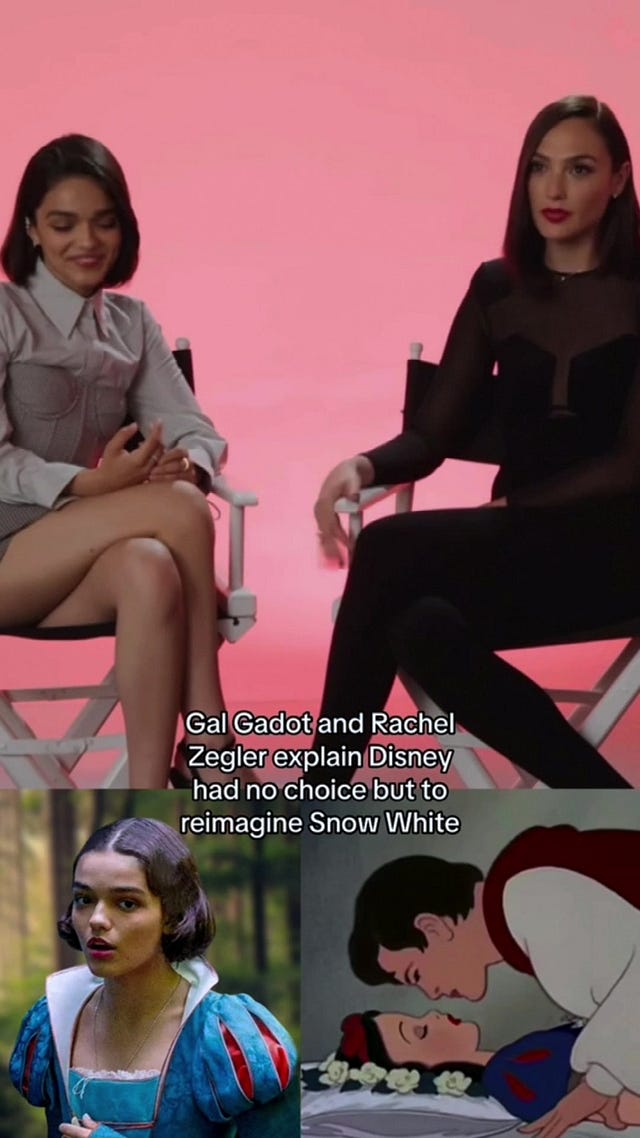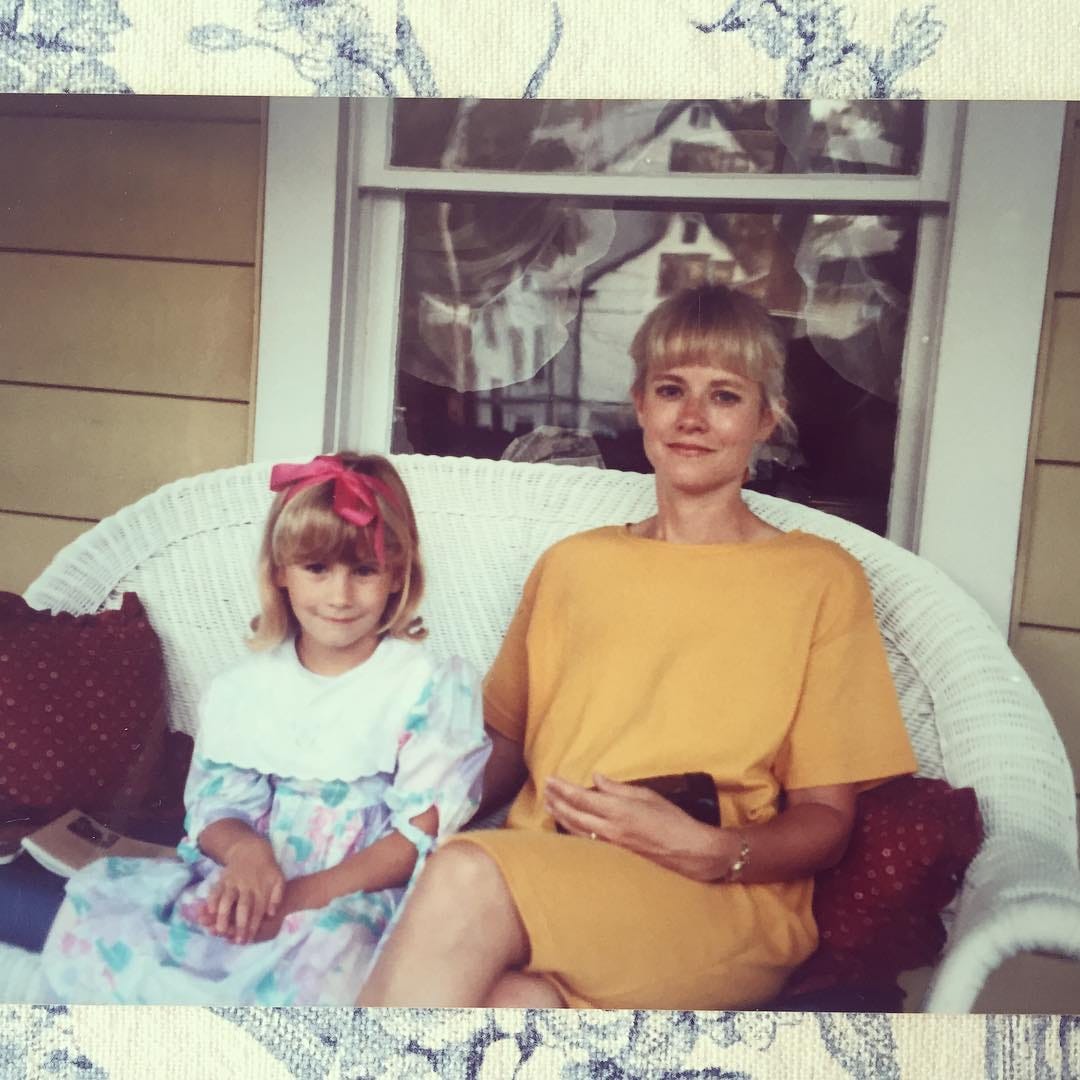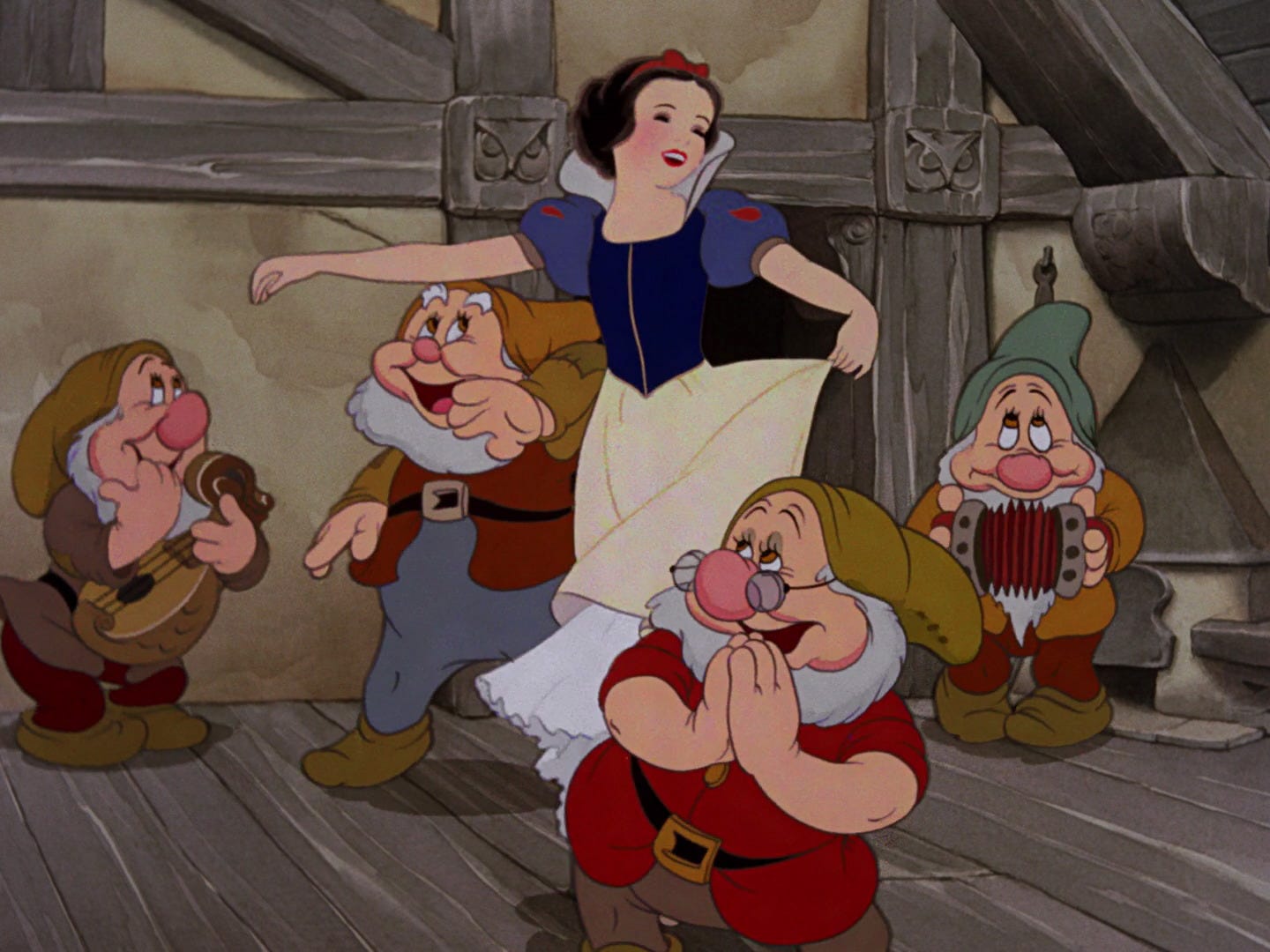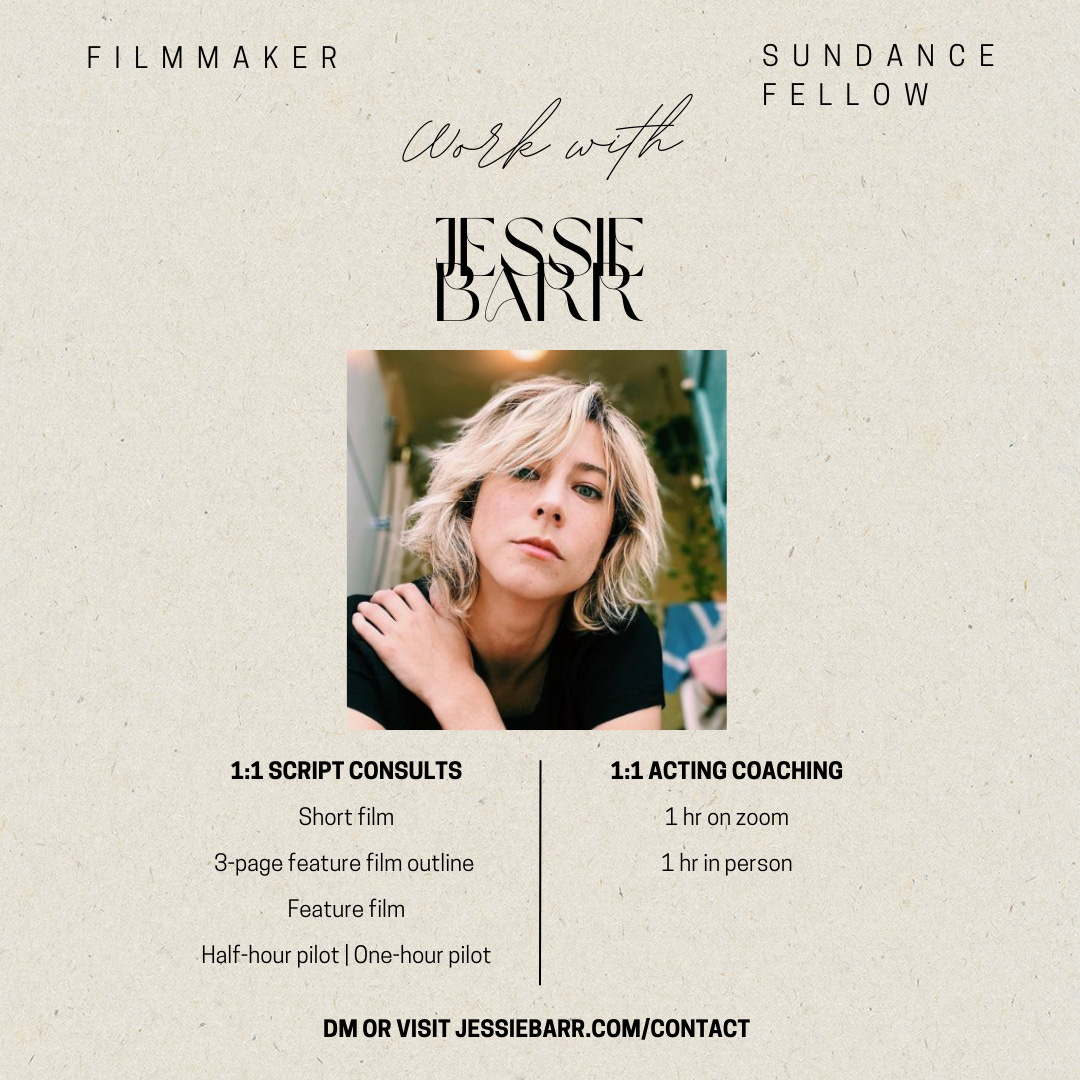What if Snow White doesn't want to be a leader?
Discourse around the Snow White remake, facing fears and why it's okay to want to fall in love.
It’s that time! I’m happy you’re here. Alright! Friday public post here. we. go
I recently went to the Hollywood Bowl with some friends to see Walt Disney Animation Studios: The Concert. Yes, I am a grown woman and yes I cried at the Peter Pan medley. Give me a break it was sung by high schoolers and their voices were perfect. In any case, I grew up on Disney animated films. I worshipped them. I wanted to be in them. I wanted to make them. So this concert was both nostalgic and challenging because Disney is a member of the AMPTP (Alliance of Motion Picture and Television Producers) and therefore one of the struck companies we - the Screen Actor’s Guild and the Writers Guild of America - have been striking against all summer. It was a challenge to hold my love for these iconic (albeit problematic) films and my anger at Disney the capitalistic death cult simultaneously, but I did it and I think holding two opposing forces at once is a powerful practice. Let me explain.
Because I was tuned into some strange Disney frequency my TikTok For You Page started showing me videos about Disney live-action remakes. One of them was this interview clip about the Snow White remake that had recently gone viral:
 Tiktok failed to load.
Tiktok failed to load.Enable 3rd party cookies or use another browser
Young people are stitching the above video (and others like it from various press junkets) and taking issue with the fact that this Snow White remake is doing away with the search for “true love” and replacing it with what’s being pitched as a modern/feminist take on the Disney classic. In this modern take Snow White’s aim is to find her power and “rule a kingdom” which is apparently something her late father told her she could do if she was “fearless, fair, brave and true”?!
Reaction video #1
Reaction Video #2
 Tiktok failed to load.
Tiktok failed to load.Enable 3rd party cookies or use another browser
Once I reemerged from this niche TikTok rabbit hole, a few things stuck with me. First I think it’s important to point out that the recent live-action remakes of classic fairytale films have seemingly been about restitution or correcting a narrative that previously expressed the princess characters as carriers of meaning but not makers of meaning. That and of course Disney wants to make money. But for the moment, let’s focus on this idea of restitution.
There has been a narrative pervasive throughout history that women are objects and not subjects, they are muses, not creators and they are good for love (and baby-making) and not much else so naturally, to correct the thousands of years of objectifying and anti-feminist representation it makes sense that studios and storytellers want to push a '“modern” and more feminist narrative. But the view of what this “feminist narrative” is is what these young TikTokers take issue with. People’s beef with a certain actress’ attitude or relationship to the source material aside, I love how, in a way, these videos are calling out Disney for pushing the ever-present “Girlboss narrative” which is both infantilizing and drives a near-impossible template of success.
This Disney Girlboss narrative asserts that women aren’t after love, they’re after leadership! They want power! They’re just like men! I mean like us (men)! We are all equal! Princesses want to control businesses, I mean lead kingdoms but they are women so they lead with kindness and integrity (oop red flag - gender essentialism)! Women want to rule and save themselves and do all the things except love, who cares about love?! They don’t need love! They love themselves, right?! They’re working on it! So down with love! Or anything but self-love! Go, feminist GirlBoss, go!
I understand where the desire for restitution comes from but I find it fascinating that the mature concept of holding two seemingly contradictory or opposite truths at the same time is possible for these young folks on TikTok - ie a princess can desire true love and be a feminist because these two things are not mutually exclusive - but less so for Disney execs or whoever is ultimately making these story decisions. Maybe people want to find true love and that’s it! Maybe they don’t want to be “a leader.” That’s okay! They are still valuable people and worthy of being reflected onscreen. Why is searching for “true love” anti-feminist? People who want love can also be feminists! And maybe being “a leader” isn’t so extraordinary but true love is! Also, people can desire love and leadership! And this notion of leadership can look like many different things. Being the leader of one’s own life is a form of leadership. Leading by example is also leadership. Does leadership always have to mean ruling over other people and literally getting the keys to the castle?! No! However, these modern remakes do not seem interested in exploring more nuanced interpretations of love, leadership, and feminism that would require holding seemingly oppositional truths at once.
I was a Disney fanatic as a child but as a young adult, I found myself fighting against the idea of the classic fairytale princess looking for love. I was of the feminist persuasion that silently judged other women for not being what I deemed, “feminist enough,” especially my mother. I was ashamed that my mom didn’t dream of leading a big company or having some fancy dream career. In my little mind, this made her a “bad feminist.” But the truth is, I was young, naive, arrogant, and misunderstood what feminism was. The truth is my mom’s dream was to create a family. She never felt seen by her own, not in the way she longed for and so she went about creating the life she dreamed. And she did it. She achieved her dream of creating a family. Granted it’s messy and imperfect and there have been deaths and divorces along the way but that’s life. That’s what dreams look like on Earth. And my mom’s happy and yep you guessed it she’s also a feminist who believes all genders should have equal rights and opportunities.
As I got older my desire to run away from the docile, helpless object that pop culture told me to be pushed me to the farthest opposite extreme. I refused to ask for help. Ever. Even when I really needed it. It would take years of fighting burnout and a brush with major anxiety and depression before I realized that “asking for help” was powerful. It’s not weak to ask for help. It’s actually a life-saving and life-affirming skill. The truth is we all need other people and that is not a flaw. The truth is not everyone wants to be a leader or someone who wields power over others. And that’s okay. It’s okay to desire love and companionship. We are relational creatures and we need each other to survive. It’s okay to want to live out your cottage-core dreams quietly in the woods with animals and a group of like-minded people who take care of each other. Esther Perel the renowned Belgian-American psychotherapist says, “Love is at once an affirmation and a transcendence of who we are.” It is two seemingly opposite truths held at once.
Let’s wrap this up with Judith Butler the American philosopher and writer whose work on gender studies has influenced political philosophy, ethics, third-wave feminism, queer theory, and literary theory. I find Butler’s ideas on feminism to be the most freeing and maybe you will too. I’d love to see Butler in the writers’ room for a Disney movie.
Butler argues that feminism made a mistake in trying to make "women" a discrete, ahistorical group with common characteristics. Butler writes that this approach reinforces the binary view of gender relations. Butler believes that feminists should not try to define "women" and believes that feminists should "focus on providing an account of how power functions and shapes our understandings of womanhood not only in the society at large but also within the feminist movement." Finally, Butler aims to break the supposed links between sex and gender so that gender and desire can be "flexible, free-floating and not caused by other stable factors". This idea of identity as free and flexible and gender as a performance, not an essence, has been one of the foundations of queer theory.
God, I love her. So much to unpack here! But that’s for another time.
for your listening pleasure:
Avoiding doing the dishes or folding that mountain of laundry that’s eating your bedroom floor? Me neither! But on the off chance you are, I highly recommend blasting this Bossa Nova Classic playlist to help you motivate. The playlist is filled with a healthy mix of recognizable tracks and lesser-known gems. Enjoy.
a poem, as promised:
I’m in the middle of reading Rick Rubin’s new book “The Creative Act: A Way of Being,” I know, I’m a cliché. Anyway, this simple instruction struck me and I haven’t been able to stop thinking about it. I know it’s not technically a poem but like a poem it arouses strong emotions because of its beauty. I also love that it reads as both an invitation and a confrontation.
It’s a reminder that the creative act is a way to express what we deem inexpressible. It also invites us to participate in the creation of our environment and in facing our fears.
What are you afraid to express? What does your environment look like when you feel free enough to let out what you’ve kept inside because of fear, shame, or doubt?
If you feel up for it, write the answers in a notebook, or even better, share them in the comment section!
The “environment” could be physical - a room in your apartment, a grassy field, a friendly tree, or an interior environment that we cultivate - a secret chamber of your heart or mind that becomes a safe place you can dip into, like stepping in a river and letting it take you somewhere.
I’ll go first cause I know it’s vulnerable. For me, the environment looks like my bed, the floor of my living room, or someplace outdoors where there’s plenty of light, a slight breeze I can feel on my legs, and no mosquitos. When it comes to what I’m afraid to express I think it’s my ugliness, darkness, pettiness, jealousy, and vanity. Whew!

